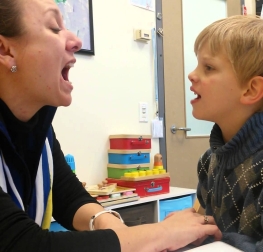Our Services
Speech Therapy and Congnitive Rehabilitation

Overview
Speech and language therapists assess and treat speech, language and communication problems in people of all ages. They help people to become independent communicators using speech, gesture and/or communication aids as needed.
They also work with people who have eating, drinking, chewing and swallowing difficulties.
Speech Therapy and Congnitive Rehabilitation
Speech and language therapists assess and treat speech, language and communication problems in people of all ages
The typical patients who may benefit from speech therapy include:
- Babies who have problems with feeding and/or swallowing.
- Children with Children with General learning disability.
- Children with language delay.
- Children with hearing problems.
- Children with difficulty in sound production such as Cleft palate, Stammering, Autistic spectrum disorders, Dyslexia, Voice disorders and Selective mutism.
- Adults with eating, swallowing and/or communication problems following stroke.
- Neurological impairment or neurodegenerative conditions such as head injury, Parkinson's disease, motor neurone disease and dementia.
- After surgery for head, neck or throat cancer
- Physical disability.
Speech Therapists can help with:
- Articulation problems: Not speaking clearly and making errors in sounds.
- Fluency problems: Trouble with the flow of speech, such as stuttering.
- Resonance or voice problems: Trouble with voice pitch, volume and quality.
- Oral feeding problems: Difficulty with eating, swallowing and drooling.
SLPs use strategies tailored for each patient’s particular challenge.
Strategies might include:
- Language intervention activities: These activities build skills in a variety of ways, including modeling and giving feedback. The therapist might use pictures and books or play-based therapy.
- Articulation therapy: The therapist models the sounds the patient has difficulty with. This might include demonstrating how to move the tongue to create specific sounds.
- Feeding and swallowing therapy: The therapist teaches the patient exercises to strengthen the muscles of the mouth. This might include facial massage and various tongue, lip and jaw exercises. therapist might also use different food textures to encourage awareness during eating and swallowing.
Speech therapists work as part of a multidisciplinary team and have close links with teachers, doctors, nurses, psychologists, occupational therapists and other health professionals. The speech-language pathologists at Citi Neuro Centre offer services with individualized treatment plans that are based on the patient's unique needs and goals.